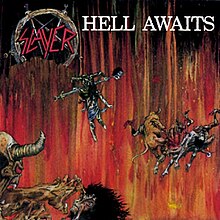Hell Awaits
| Hell Awaits | ||||
|---|---|---|---|---|
 |
||||
| Studio album by Slayer | ||||
| Released | March 1985 | |||
| Recorded | September - October 1984 | |||
| Studio | Eldorado Studios, Los Angeles, California | |||
| Genre | Thrash metal | |||
| Length | 37:11 | |||
| Label | Metal Blade | |||
| Producer | Slayer, Brian Slagel | |||
| Slayer chronology | ||||
|
||||
| Professional ratings | |
|---|---|
| Review scores | |
| Source | Rating |
| AllMusic | |
| The Rolling Stone Album Guide | |
| Rock Hard | (9/10) |
Hell Awaits is the second studio album by American thrash metal band Slayer, released through Metal Blade Records in 1985. The band's previous release, Show No Mercy, became Metal Blade Records' highest selling release; as a result, producer Brian Slagel desired to release a second Slayer album. To that end, Slagel financed a recording budget (Show No Mercy was paid for by band members) and recruited several experienced producers to help in the studio.
Lyrical themes on Hell Awaits include hell and Satan, as their debut. The intro of the first track "Hell Awaits" played backwards reveals the repeated phrase "join us". Musically, the album features the band's most progressive and diverse work compared to their previous releases, and according to Kerry King, he and Jeff Hanneman were very into Mercyful Fate at the time, which then led to the longer and more progressive songs. Defined as "influential to future extreme metal acts," the most popular songs from Hell Awaits were re-recorded by various underground metal bands and have appeared on several tribute albums.
Slayer's previous album, Show No Mercy, became Metal Blade Records' highest selling release, selling 40,000 copies worldwide; the success led producer Brian Slagel to want to record another album with them. Slagel hired producer Ron Fair, who worked for Chrysalis Records, and had seen the band perform live and enjoyed their performance. On seeing Slayer in the studio, Fair stated, "Wow, these guys are really angry," as he was inexperienced working with heavy metal musicians. Slagel financed the album, in stark contrast to Show No Mercy, which was financed by singer Tom Araya, who used his earnings as a respiratory therapist, and a loan from guitarist Kerry King's father.
...
Wikipedia
